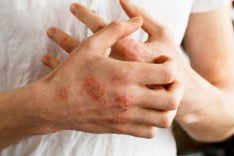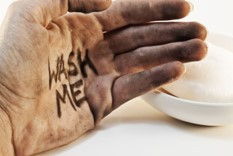What is the best way to remove paint from your skin?
- Did you know that it is dangerous to leave paint on your skin for a long time?
- Did you know that many of the commonly used solutions are also harmful to your skin?
We are happy to help you remove paint from your skin in a responsible and skin-friendly manner.
What is paint?
In order to remove paint from your skin effectively, it is important to understand what paint is and why it is so difficult to remove from your skin. Paint is a liquid, paste or powder mixture used daily by painters and plasterers when painting window frames, doors, walls and ceilings, for example. Almost all types of paint consist of three components. Almost every type of paint contains pigments (a type of powdered colouring agent). The pigment determines the colour of the paint. Another component is the binding agent. This ensures that the paint adheres well after drying. The binding agent is often a type of resin. The last component is a solvent. This thins the paint, making it easier to apply. Paints can be roughly divided into two different categories. There are lacquer paints and wall paints.

Why is it so difficult to remove paint from my skin?

The binder ensures that the pigment particles in the paint adhere to each other and to the substrate. Unfortunately, the pigments also attach themselves to surfaces where we would rather not have them, namely our skin. The binding agents have a strong effect on the skin, making it difficult to remove the paint from the skin.
Why is it important to remove paint from my skin?
A painter comes into contact with binders and solvents from paint on a daily basis, for example when mixing and applying paint, but also when sanding paint layers. Apart from the frustration you feel when you cannot get your skin clean, this also poses health risks. Binders and solvents are known to cause skin allergies. They irritate the skin severely and can cause allergic eczema. If the skin is not cleaned properly, each subsequent contact will cause an increasingly strong reaction.

How can I remove paint from my skin?

You can find numerous solutions for removing paint from your skin on the internet. That is why we have listed the most important ones for you, with their respective advantages and disadvantages.
| Method | Effectiveness | Skin-friendly | Environmentally friendly |
| Chemical solutions (thinner/turpentine) | +++ | --- | --- |
| Professional hand cleaner | +++ | ++ | ++ |
| Lotions & creams | + | +++ | ++ |
| Natural remedies (salt scrub / butter / coffee / olive oil) | + | + | +++ |
- Chemical solutions are particularly effective, but also dangerous for the skin and the environment. Thinner and white spirit, for example, can dry out your skin and cause allergic reactions. Furthermore, bleaching agents break down the colourants. Your hands may look clean, but they are not, because the binding agents are still on your skin.
- A professional hand cleaner often contains esters, which also ensure that the binding agent dissolves. This makes it easy to remove the dirt from the skin. Certain professional hand cleansers also contain excess fatty acids and vitamins that help repair the skin.
- Lotions and creams: Baby oil and petroleum jelly can also be used to remove paint from your skin. A skin-friendly method, but less effective. You will need to wash your hands several times before the paint is removed.
- Natural remedies: salt scrub, butter, coffee, or olive oil are also frequently mentioned when it comes to removing paint from the skin. Salt scrub and coffee scrub the paint off your skin. This can cause skin irritation and is not always effective. Olive oil and butter will make the paint liquid again, allowing it to be removed with a cloth. However, this often means that it is not possible to remove all the dirt.
Allow us to assist you
Would you like to remove paint from your skin quickly and easily from now on? Order Dreumex Expert Wipes or Dreumex Expert directly from one of our partners or become one of our partners and sell Dreumex Expert Wipes and/or Dreumex Expert yourself in your store.


